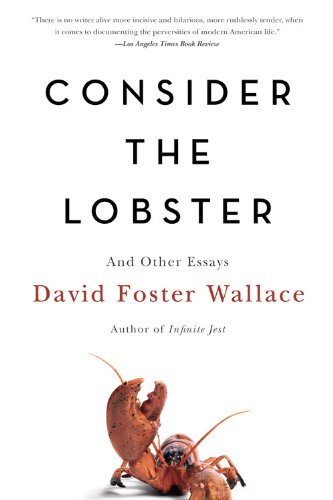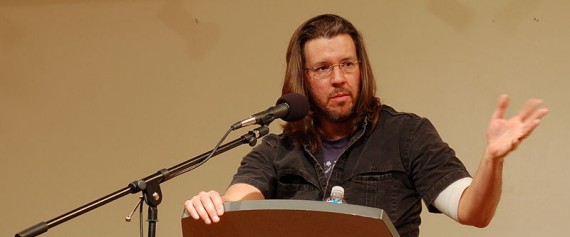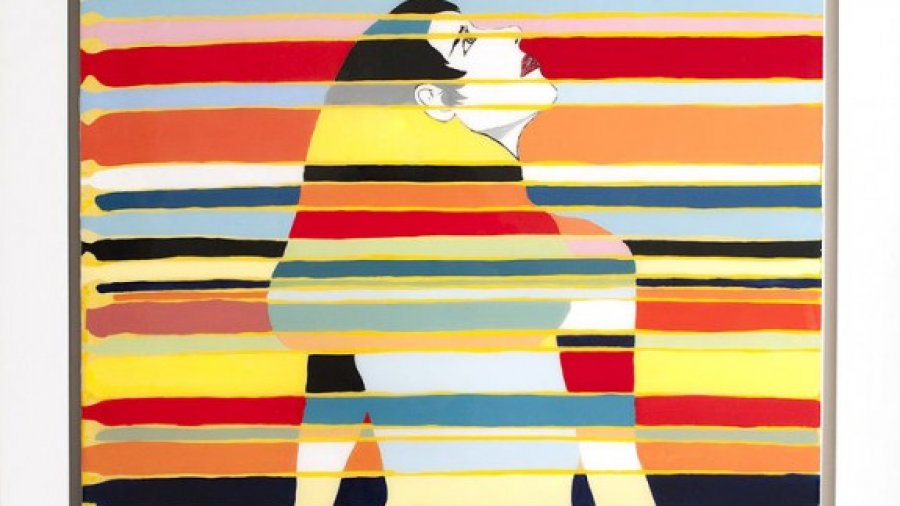“Aren’t there parts of ourselves that are just better left unfed?”
David Foster Wallace’s Consider the Lobster and Other Essays is a rare sort of book—one which traverses boldly across numerous disciplines to dissect the dark underbelly of modern American culture, politics, and society. Published nearly 10 years ago, Wallace’s conscientious commentary remains utterly poignant today, and its central theme—that we, as individuals, must take responsibility for becoming thoughtful and scrupulous cultural participants lest we be led as blind cattle to doom by the misguided or maligned agendas of those in power—is arguably timeless and universal. Thus, a hearty recommendation to anyone with a pulse: purchase and read Consider the Lobster.

Though I appreciated literally every essay in the book, blogging convention demands that I select and discuss a single essay: Host. Host is a lengthy profile of conservative political talk radio host John Ziegler (published in The Atlantic in 2005, you can [and should] actually read the whole piece here, though for reasons related to awkward formatting this essay is best read in print) in which Wallace manages to capture seemingly every reason ever to maintain a healthy skepticism w/r/t the news media industry (and anyone trying to sell you something). Many of Wallace’s insights are summarized and elaborated upon here in an attempt to elucidate the less-than-noble side of news media:
News outlets are businesses, first and foremost.
“Whatever the social effects of talk radio or the partisan agendas of certain hosts, it is a fallacy that political talk radio is motivated by ideology. It is not. Political talk radio is a business, and it is motivated by revenue. The conservatism that dominates today’s AM airwaves does so because it generates high Arbitron ratings, high ad rates, and maximum profits.”
This apparently obvious reality must be emphasized because it is the context in which the majority of Wallace’s other insights become especially juicy and meaningful. News outlets often purport to be fair, balanced, non-partisan sources of information serving the public good, but it is essential to recognize that most of them (except certain non-profit news outlets and small publications) are profit-driven institutions supplying a product—cherry-picked “news” interpreted through a particular ideological lens—to an audience that they know desires that particular flavor of “news”. As with any commercial enterprise, success means convincing people to give you attention and money. And this state of affairs is not always at odds with honesty and public good, but it sure as hell can be an awful lot of the time.
Wallace dispenses various anecdotes and bits of evidence to demonstrate KFI’s (Ziegler’s Southern California radio station employer, as of 2005) prioritization of profit, most of which I will not detail here. Suffice to say that in one hour of 2005’s “John Ziegler Show” on KFI, 40% (yes, 40%) of the hour was reserved for advertisements, and despite consistent complaints about the absurd ad-snafu, the station cut back on ads only if the ratings suggested that a non-negligible portion of listeners were in fact abandoning the show due to ad-overload.
Claiming absolute knowledge is profitable.
“[T]he ever increasing number of ideological news outlets creates precisely the kind of relativism that cultural conservatives decry, a kind of epistemic free-for-all in which “the truth” is wholly a matter of perspective and agenda. In some respects all this variety is probably good, productive of difference and dialogue and so on. But it can also be confusing and stressful for the average citizen. Short of signing on to a particular mass ideology and patronizing only those partisan news sources that ratify what you want to believe, it is increasingly hard to determine which sources to pay attention to and how exactly to distinguish real information from spin.”
We’ve reached a point of such saturation with sources of information that it is difficult to know in whom to place trust and upon whom to cast the stink eye. Naturally, there is a premium on “The Truth,” and so news outlets conflate information and spin, claiming to be without bias (see Fox News’ “No Spin Zone,” et al.). Just as no TV commercial will ever say something like “From our perspective, it is quite possible that our product might make you sexier, more confident, perpetually glowing with transcendent radiance, etc. etc.”; news outlets will not admit to editorializing or slanting the news because “The Facts” are so much more clear-cut, and in a convoluted world, the average American likes clear-cut.
Wallace argues that partisan news “enables the conviction that [information and spin] aren’t really distinct at all” and that such a conviction transforms democratic discourse from a “battle of ideas” to a “battle of sales pitches for ideas”. Thus what should be a mutual effort toward a just and objective portrayal of events becomes a competition to be the most seductive, self-assured, “stimulating”.
Stimulating emotion is profitable, and negative emotions are much easier to stimulate.
“The fact of the matter is that it is not John Ziegler’s job to be responsible, or nuanced, or to think about whether his on-air comments are productive or dangerous, or cogent, or even defensible. That is not to say that the host would not defend his “we’re better”—strenuously—or that he does not believe it’s true. It is to say that he has exactly one on-air job, and that is to be stimulating.
[…]
John Ziegler is not a journalist—he is an entertainer. Or maybe it’s better to say that he is part of a peculiar, modern, and very popular type of news industry, one that manages to enjoy the authority and influence of journalism without the stodgy constraints of fairness, objectivity, and responsibility that make trying to tell the truth such a drag for everyone involved. It is a frightening industry, though not for any of the simple reasons most critics give.”
Granted, Wallace is here talking about a particular segment of the news industry—political talk radio—that is rampantly partisan (overwhelmingly conservative) and justifies its (often hateful and offensive) existence by asserting itself as in opposition to the “Liberal Bias” in mainstream media. Wallace is commenting on a man—Ziegler—who makes ambiguous, destructive, sweeping generalizations like “[America is] better than [the Arab world].”
Other news outlets must be more discrete and restrained in fusing opinion and emotionally-charged hand-waving with “news,” but they certainly do. The urge to stimulate emotion (and thus entertain and attract a wide audience) can be seen clearly in the way in which mainstream news outlets latch onto tragedies and negative-emotion-inducing stories and milk them until they’re Gobi-dry. As Wallace writes:
“It is, of course, much less difficult to arouse genuine anger, indignation, and outrage in people than it is real joy, satisfaction, fellow feeling, etc. The latter are fragile and complex, and what excites them varies a great deal from person to person, whereas anger et al. are more primal, universal, and easy to stimulate.”
This psychological principle naturally births a “news” climate that presents an image of a decidedly forlorn and suffering world. As Kanye West once sang, “It’s been a while since I watched the tube / Cause like a Crip said, I got way too many blues for any more bad news.” That’s not to say that there isn’t a whole lot of deeply unsettling and (frankly) f***ed up shit happening in the world that you and I should know about and care about changing; there is (there’s also a lot of swell and peachy stuff). The point is simply that news outlets paint this picture because it garners the most viewers, not because it is a balanced perspective. It’s a kind of twisted entertainment (in the I-should-look-away-but-I-can’t sense of the word; think reality TV).

DFW gives a reading circa 2006. Via Wiki Commons
Conflating news and entertainment is profitable.
Wallace sits in on a meeting between John Ziegler and his superior, Robin Bertolucci, in which Ms. Bertolucci explains to Ziegler why he should have dedicated more time and energy to a criminal trial story that the morning’s hosts had explored exhaustively. She draws a comparison between the story and a new Christina Aguilera song, suggesting that if their station were a music station they would play that song all day irregardless of repetition concerns. About this, Wallace writes:
“By way of post-meeting analysis, it is worth noting that a certain assumption behind Ms. B.’s Christina Aguilera analogy—namely, that a criminal trial is every bit as much an entertainment product as a Top 40 song—was not questioned or even blinked at by either participant. This is doubtless one reason for KFI’s ratings éclat—the near total conflation of news and entertainment. It also explains why KFI’s twice-hourly newscasts (which are always extremely short, and densely interwoven with station promos and live-read ads) concentrate so heavily on lurid, tabloidish stories.”
Do consider that there is a spectrum on which news outlets could be situated based upon the extent to which they will blatantly sacrifice journalistic integrity in service of entertaining viewers/listeners/readers, and that on this spectrum most political talk radio shows would be among the most shameless in prioritizing entertainment over accuracy or balance. Yet, again, the sort of stories that are beaten raw on a daily basis by mainstream news outlets are those charged with upsetting, can’t-look-away “entertainment” potential. Perhaps the most incisive satirical genius of The Colbert Report resides in its fundamental premise: to openly and flamboyantly combine news and entertainment.
“Us vs. Them” is profitable.
As mentioned above, Ziegler was quoted by Wallace as declaring that “[America is] better than [the Arab world].” More specifically, Ziegler said, “We’re not perfect, we suck a lot of the time, but we are better as a people, as a culture, and as a society than they are, and we need to recognize that, so that we can possibly even begin to deal with the evil that we are facing.” Early on in the essay, Wallace critiques and complicates Ziegler’s stance with a number of questions (e.g. “Exactly what and whom does “the Arab world” refer to?”) before raising one of the essay’s central concerns:
“Leaving aside whether John Ziegler’s assertions are true or coherent, is it even remotely helpful or productive to make huge, sweeping claims about some other region’s/culture’s inferiority to us? What possible effect can such remarks have except to incite hatred? Aren’t they sort of irresponsible?”
Recall that John Ziegler was not hired to be accurate or fair or helpful, but simply to stimulate and to entertain. The truth is that no, it isn’t productive to make all-encompassing statements about the inferiority of any particular group of humans. But Ziegler wasn’t hired to be productive; he was hired to bring in listeners. And sadly, KFI’s stellar ratings in 2005 make it clear that quite a lot of people crave the sort of “moral clarity” (a concept Wallace later broaches upon) provided by a definitive statement like “We are better than them.”
From a young age, we’re told stories of “good” vs. “evil” that present humans as either inherently moral or immoral. This lack of moral ambiguity is seductive, but it is dreadfully and perhaps harmfully misleading. As the adage goes, “Let him who is without sin, cast the first stone.” As we exit our youth, it presumably becomes clear to us that all humans are fallible—that all have potential for benevolence and shitheadedness. Yet, rather than engage this messy and unsettling truth, a hefty number of people persist in the delusion that some people are good while others are bad, or that some groups are superior to others (Advertisers benefit from this tendency by framing products as being used by a particular in-group that is “cool,” “hip,” “classy,” etc. etc. [i.e. superior]; consumers anxiously desire membership in the “superior” group and trade money [i.e. hours of their lives] for what they perceive to be a superior status).
Opinions of the ‘we’re better than them’ persuasion can be succinctly and triumphantly stated and thus equate to captivating and emotionally stirring talk radio (remember: negative emotion can be more universally provoked; notice how these points are all interconnected). As Wallace points out, it is apparently much less stimulating to discuss “liberal” notions (e.g. approaching others from a place of tolerance and reflection). Some folks are just thirsty for fighting words, perhaps. But why? Maybe they’re afraid.
It’s easy to sell things to people who are afraid.
Wallace contemplates the sort of person that might be desperate to hear and latch onto a statement such as “We’re better than they are.” (for some reason the following passage is not in the online version of the essay):
“[Has the US] moved so far and so fast toward cultural permissiveness that we’ve reached a kind of apsidal point? It might be instructive to try seeing things from the perspective of, say, a God-fearing hard-working rural-Midwestern military vet. It’s not that hard. Imagine gazing through his eyes at the world of MTV and the content of video games, at the gross sexualization of children’s fashions, at Janet Jackson flashing her aureole on what’s supposed to be a holy day. Imagine you’re him having to explain to your youngest what oral sex is and what it’s got to do with a US president. Ads for penis enlargers and Hot Wet Sluts are popping up out of nowhere on your family’s computer. Your kids’ school is teaching them WWII and Vietnam in terms of Japanese internment and the horrors of My Lai. Homosexuals are demanding holy matrimony; your doctor’s moving away because he can’t afford the lawsuit insurance; illegal aliens want driver’s licenses; Hollywood elites are bashing America and making millions from it; the president’s ridiculed for reading his Bible; priests are diddling kids left and right. Shit, the country’s been directly attacked, and people aren’t supporting our commander in chief.
Assume for a moment that it’s not silly to see things this man’s way. What cogent, compelling, relevant message can the center and left offer him? Can we bear to admit that we’ve actually helped set him up to hear “We’re better than they are” not as twisted and scary but as refreshing and redemptive and true? If so, then now what?”
Wallace imagines this “God-fearing hard-working rural-Midwestern military vet” as he’s considering the question of why conservativism has become so popular in his 2005 America. He posits that US culture has changed rapidly and dramatically and that with those changes an entirely new set of concerns has arisen. Naturally, the psyches of certain types of Americans have not adapted so well, leaving a chunk of the population feeling disoriented, scared, desperate. This sort of person is looking for salvation wherever they can find it: on the lips of raving newscasters or rabblerousers or in some janky merchandise product. Wallace suggests that some news outlets understand well that it is to this demographic they are catering, and that evidence of their awareness can be seen in the ads they run alongside their shows:
“One has only to listen to Coast to Coast With George Noory‘s ads for gold as a hedge against hyperinflation, special emergency radios you can hand-crank in case of extended power failure, miracle weight-loss formulas, online dating services, etc., to understand that KFI and the syndicator regard this show’s audience as basically frightened, credulous, and desperate.”

‘Ella’ by Jorge Azar. Photo Credit: Wiki Commons
News Media + Capitalism = Darkness?
The sum of the above points is a rather unflattering picture of news media. Granted, one is justified in arguing that these claims apply primarily to a somewhat dodgy segment of news outlets. Yet, while reading Wallace’s piece I felt as if so many of the criticisms could be justifiably raised not only against radical political talk radio, but also against most-if-not-all mainstream news sources (to varying degrees).
Furthermore, as John Powers observes in a quote cited by Wallace: “Just as the proliferation of blurbs in movie ads has made all critics appear to be idiots or flacks, so the rabbitlike proliferation of news sources—many of them slipshod, understaffed, or insanely partisan—has inevitably devalued the authority of any individual source.” In other words, an inescapable consequences of having a bunch of shitty, shady news sources is that all news sources end up suspect.
So even the proverbial “good guys” of the news world must pass a litmus test of news-seeker scrutiny. And as well they should, I think. Because as has been demonstrated in the foregoing, the capitalistic system in which news outlets operate provides ample incentive to present interpretation as Truth; to aim to provoke negative emotion; to combine “news” and entertainment; to pin people against one another; and to target people who are fearful and vulnerable.
The potential payoff for employing these underhanded rhetorical tactics has birthed a news industry in which misinformation, fear-mongering, and hate-mongering are often lucrative business decisions. And of course, there will always be people willing to do anything for the right price. Near the end of the essay, Wallace ponders a 10-year “murder-anniversary” TV interview with O.J. Simpson, treating this one interview as a sort of microcosmic representation of why the profit-driven world of “news” is concerning:
“Plus of course there’s the creepy question of why O.J. Simpson is doing a murder anniversary TV interview at all. What does he possibly stand to gain from sitting there on camera and letting ten millions of people search his big face for guilt or remorse? Why subject himself to America’s ghoulish fascination? And make no mistake — it is fascinating. The interview and face are riveting television entertainment. It’s almost impossible to look away, or not to feel that special kind of guilty excitement in the worst, most greedy and indecent parts of yourself. You can really feel it: this is why drivers slow down to gape at accidents, why reporters put mikes in the faces of bereaved relatives, why the Haidl gang-rape trial is a hit single that merits heavy play, why the cruelest forms of reality TV and tabloid news and talk radio generate such numbers. But that doesn’t mean the fascination is good, or even feels good. Aren’t there parts of ourselves that are just better left unfed? If it’s true that there are, and that we sometimes choose what we wish we wouldn’t, then there is a very serious unanswered question at the heart of KFI’s sweeper: “More Stimulating” of what?”
This passage is Wallace’s proverbial roundhouse kick to the throat of news media. Aren’t there parts of ourselves that are just better left unfed? Few would argue that there are not. But when it becomes profitable to stimulate the “greedy” and “indecent” and scandal-hungry parts of the human psyche, hordes of folks with dollar signs for pupils will line up to take advantage. Wallace goes on:
“Is this not a crucial part of Minow’s old distinction between what interests us and what’s truly in our interests — that there are parts of people that we should choose, as a community, not to cater to and gratify and strengthen?
But what if it’s good sound business to cater to those parts? Then what? Government regulation? Of which industries, by exactly whom, and based on what criteria? And what about the First Amendment?”
It comes down to this: there are parts of people that should not be nourished, but our system gives news outlets/all businesses the right to nourish those parts for big bucks. And it would be precariously difficult and possibly unconstitutional to try to legislate a different reality.
So, like, where does that leave us? Answer: it’s on us to be aware, for our sake and for the sake of others. We must scrutinize and reflect upon what intentions lurk beneath the content and rhetoric of our sources of information (and of anyone trying to sell to us, for that matter) and consciously determine for ourselves what is valuable and what is smegma. To quote Wallace one final time, from his unforgettable ‘This is Water’ commencement address:
“Learning “how to think” really means learning how to exercise some control over how and what you think. It means being conscious and aware enough to choose what you pay attention to and to choose how you construct meaning from experience.”
We ought to choose how and what we think—what we look at and how we make sense of what we see. If we don’t, someone else will happily do the thinking for us.
If this was cool, subscribe via email/RSS and follow me on Twitter.
 P.S. Once again, I strongly urge you to read Consider the Lobster.
P.S. Once again, I strongly urge you to read Consider the Lobster.
About Jordan Bates
Jordan Bates is a Lover of God, healer, mentor of leaders, writer, and music maker. The best way to keep up with his work is to join nearly 7,000 people who read his Substack newsletter.





This hits close to home; my grandparents are deeply affected by these talk radio shows and Fox News to the point where it is now difficult to have a family dinner without discussions of how terrible President Obama is. It really makes me sad that people I love so much are allowing themselves to be brainwashed instead of thinking for themselves.
Nick,
I’m really sorry to hear that about your grandparents. They’re definitely not alone. Perhaps they have some real points. I guess all we can do is try to discuss things with an open mind and try to challenge certain ideas in a way that plants the seeds of deeper consideration and reflection. Thanks for commenting.
Curse you for making me think when I’m supposed to be a mindless machine churning out words and sentences for my clientelle. I recently read a piece on medium that mentioned how the internet has made the focus 100% on speed rather than accuracy, as that’s how you cash in on happenings as an internet news provider. (Get in early, get as many pageviews as you can, apologize for providing faulty information later.) After reading the piece, I read some articles in online newspapers, and found that in something like 30% of them, they had gotten the name of one… Read more »
Ragnar, Sorry to make you think. 🙂 It’s fascinating to consider the Internet as a case study in media, considering Wallace wrote this essay in 2005 (nearly a century ago in Internet years, it seems like). It’s terribly sad to see journalistic integrity tossed to the wayside in favor of monetization. I guess the world of publishing really is in a serious bind. Ah, and yes, Buzzfeed and its innumerable knock-offs are a truly sinister form of attention/information pollution. I’m really intrigued by this “no information diet” idea. I hadn’t heard of it. I’d like to give it a try.… Read more »
excellent article, thank you, and I will read the book as well. ( I have read many of your recommendations, and I do thank you for the introduction to the excellent Red Pine) I’m disheartened by the sledgehammer impact of the negative consequences of addiction to “The Gogglebox”. You think the Roman Gladiatorial Games are dead? Really? No more vulnerable people being cruelly mocked, ridiculed, hurt in public, for the nasty, titillating, belly laughing “enjoyment” of jeering onlookers? Really? That’s what you think? Look again. That’s just one of the many negative horrors. “Feeling”, “empathy”, is under a sustained assault.… Read more »
Extremely late reply: your comments are appreciated, as always, Francis. Thanks. 🙂
Great summary of Consider the Lobster and DFW in general Jordan.
I also recommend DFW’s other two essay collections “The Supposedly Fun Thing I’ll Never Do Again” and “Both Flesh and Not.” They each have their media criticism as well.
Plus, I recommend his interview collection, of which the title escapes me.
Joseph,
most definitely. i’ve read some of DFW’s other essays but would like eventually to read those collections in their entirety. hit me up via email ([email protected]) about writing something for RTM. i think you sent me something but email it to me and i’ll remember to get back to you.
Thanks for this summary Jordan, hadn’t heard of David Foster Wallace – definitely gonna check him out. If you’re interested in the biases, the role and the potential of the media you should check out Alain De Bottons latest book – The News: A User’s Manual. A lot of quoteables but these two stuck out: “News organizations are coy about admitting that what they present us with each day are miniscule extracts of narratives whose true shape and logic can generally only emerge from a perspective of months or even years….they are institutionally committed to implying that it is inevitably… Read more »